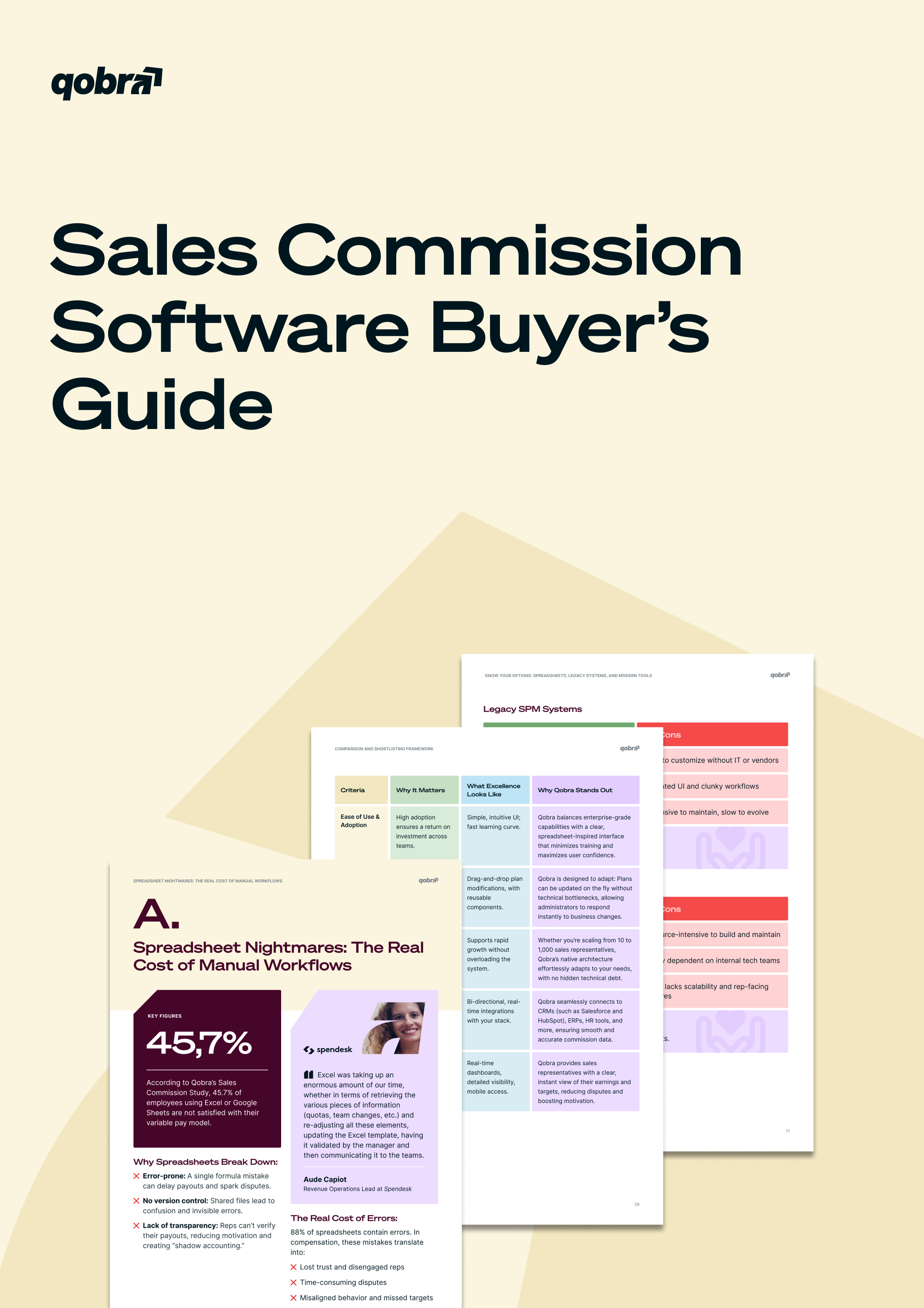Introduction
Reviewing your sales commission plan is essential for any company seeking to maximize the motivation, retention and performance of its sales reps. An ill-adapted remuneration plan can have a negative impact on the sales dynamic and slow down the company's growth.
"A good commission plan has a considerable impact on retention, motivation and performance."
Vladimir Ionesco, Director of Global Sales Performance at Doctolib
It is therefore vital to ask regularly whether the company's strategic objectives are being properly reflected in its commissions schemes.
Figures to remember
88% of respondents to a survey conducted by Primeum felt that their company's commission system could be improved. This dissatisfaction may be a strong signal that the remuneration mechanisms are not in line with the company's objectives or the aspirations of the sales reps.
The company's stage of development is a key factor in the evolution of these plans. For example, a company that is in the process of conquering a new market will be well advised to focus its commissions on acquiring new customers. Conversely, a more mature company may direct its commission towards objectives such as upselling or customer loyalty, in order to better align sales reps with its strategic objectives.
Another critical factor is the evolution of the market. In a fast-growing competitive environment, sales reps have to redouble their efforts to stand out from the crowd, and this may mean readjusting commissions. The sales strategy itself may also evolve, with the introduction of new products or services, for example, or the adoption of a new business model. In such situations, the remuneration model needs to be adapted to remain consistent with the company's new strategic priorities.
An unsuitable sales commission plan can also lead to a drop in sales rep performance or high turnover within the sales team. According to INSEE, the turnover rate among sales reps can be as high as 50% in certain sectors, and commissions is one of the main causes of this phenomenon. A high turnover of the best sales reps could mean that commissions are not in their favor, while difficulty in recruiting could indicate a lack of attractiveness of the remuneration package.
A lack of transparency, poorly defined targets or uninspiring commission can also lead to a general demotivation of sales teams, hampering the company's growth. In this context, the tool used to manage these commissions plays an important role.
"With Excel, there's a grey area that gets created, where you're not really sure that the commission model and bonus are being applied correctly."
Vladimir Ionesco, Director of Global Sales Performance at Doctolib
It is therefore essential to adapt the commission plan on a regular basis so that it remains in line with the company's objectives, market trends and the expectations of the sales reps. Continuous reflection on this topic, accompanied by benchmarks and gradual adjustments, will enable the company to keep its teams motivated and performing well, while ensuring sustainable growth.
To find out more
Read our article "When should you change your commission plan?", and find out when it's time to change or modify your sales commission plan, and how to adapt it for the right reasons!
The objectives of the White Paper
- Help you carry out a structured and methodical review of your sales commission plan.
- You will propose a practical, operational approach involving your Sales Reps, Operations and Finance departments.
- You'll be highlighting tried and tested practices for improving the effectiveness and relevance of your commission system.
Summary
Part 1: Preparation and initial diagnosis
1. Identify the reasons for the review
a. Analysis of triggers
b. Objectives of the review
2. Forming a cross-functional project teams
a. Roles of the various departments
b. Importance of project team leadership and collaborative decision-making processes
3. Analyze the performance of the current plan
a. Data collection
b. Gathering feedback from sales reps and managers
Part 2: Defining the objectives of the new plan
1. Alignment with corporate strategy
a. Defining the company's new priorities
b. Translate strategic objectives into the structure of sales commissions
2. Setting clear, measurable objectives
a. Define key KPIs for the sales commission plan
b. The importance of realistic but ambitious targets
3. Identification of sales reps to be encouraged
a. What actions and attitudes should the new plan promote?
b. Consistency between financial rewards and expected behavior
Part 3: Design of the new sales commission plan
1. Choosing the right commission structure
a. Simple commission
b. Relative commission
c. Absolute commission
d. Straight-line commission
e. Commission per level
f. Commission deduction
g. Commission on territory volume
h. Residual commission
i. Gross margin commission
j. Multiplier commission
2. Defining tiers and bonuses
a. How do you set fair and motivating commission levels?
b. Propose additional bonuses for specific behaviors and objectives
3. Include control and correction mechanisms
a. Managing the unexpected
b. Setting up periodic reviews
4. Testing the viability of the sales commission plans
a. Carry out financial simulations
b. Gathering feedback from sales reps and managers
Part 4: Implementation and monitoring
1. Internal communications
a. How do you explain the new sales commission plan to your teams?
b. Transparency on expectations and benefits
2. Setting up monitoring tools
a. Adapting commission management and reporting tools
3. Performance monitoring and adjustments
a. Regular analysis of the plan's effectiveness
b. Adjustment mechanisms







